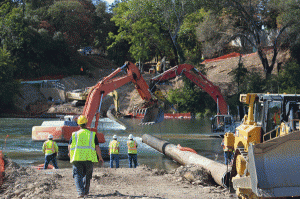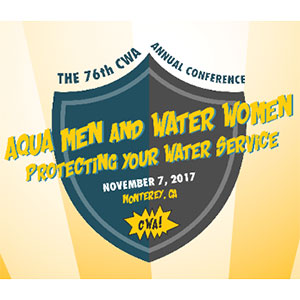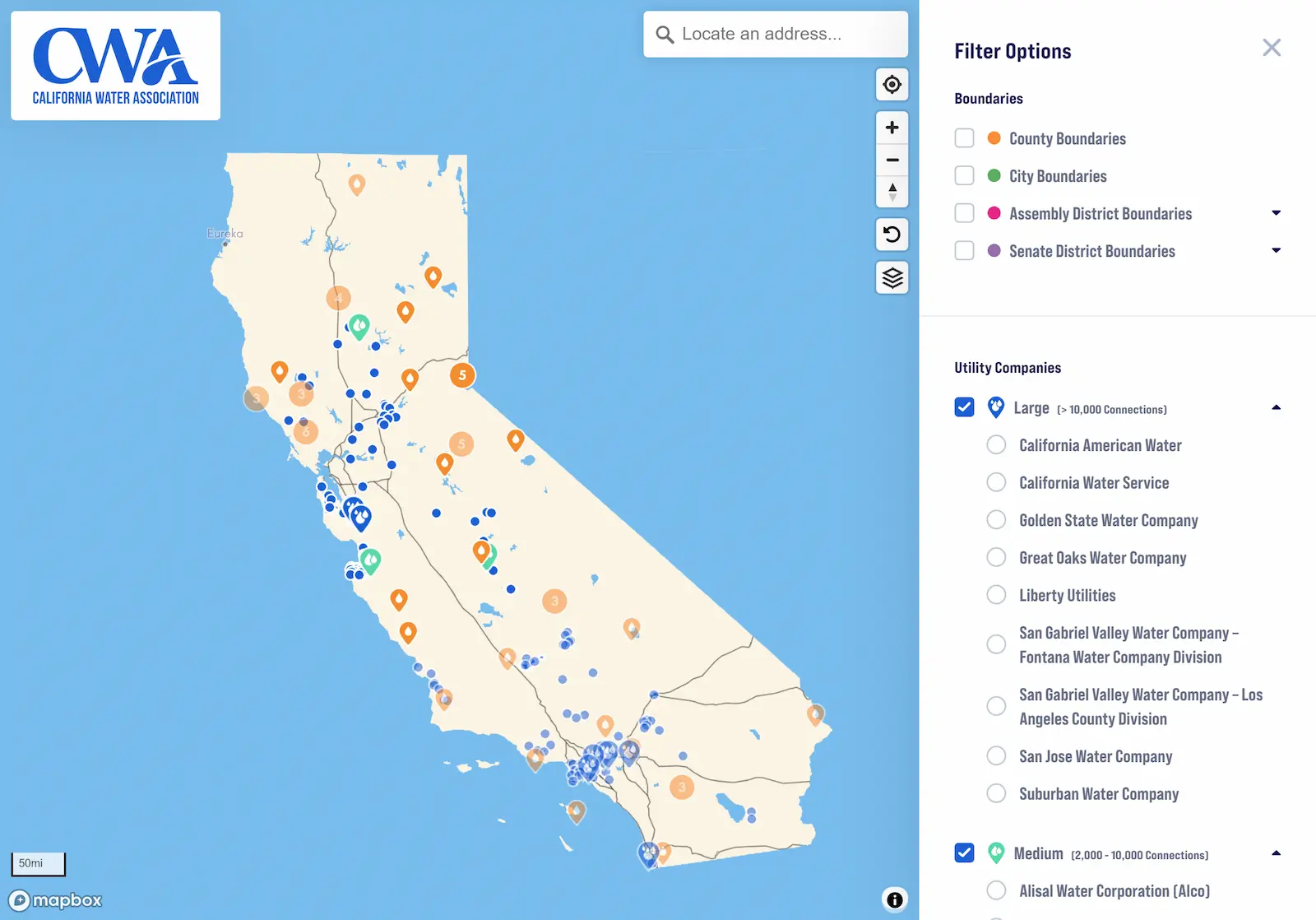California Water Association’s (CWA) Legislative Committee was busy in April and early May providing input to the state Legislature on a number of bills related to water supply and cost allocation, water quality, low income rate assistance and water use efficiency. Foremost among the bills on which CWA has been active are the suite of water bond bills. At this point, CWA has testified or written letters in support of three of them:
- AB 2554 (Rendon) – Formerly AB 1331, this bill was amended to increase the dollar amount to $8.5 billion; water utilities regulated by the California Public Utilities Commission (CPUC or Commission) are now included as eligible applicants for grant funding from the bond proceeds.
- AB 2686 (Perea) – This is a $9.25 billion bond alternative that includes $3 billion continuously appropriated for storage and CPUC-regulated water utility eligibility.
- SB 1250 (Hueso) – Largely similar to AB 2686, this bill would propose a $9.4 billion bond that would include appropriations for water quality, water supply reliability, Delta sustainability, storage, watersheds, groundwater sustainability and water recycling/desalination. It also includes CPUC-regulated water utility eligibility.
Another water bond bill with CPUC-regulated water company eligibility, SB 848 (Wolk), proposes a $6.8 billion bond. SB 848 has already passed the Senate Natural Resources and Water (NR&W) and Appropriations Committees and is awaiting floor action. AB 2554 and AB 2686 passed the Assembly Water Parks and Wildlife Committee on April 30, although Committee Chair Rendon was forced to accept new amendments related to groundwater cleanup that added $1 billion to the bill’s price tag, bringing it to a total of $9.5 billion. SB 1250 was held by the Senate NR&W Committee, also on April 30, to give the bill’s author time to confer with Senator Wolk to see if those bills can move toward comparability with each other.
CWA also has addressed two CPUC-related bills in the past month. One was AB 2281 (Hagman), which would have added two members of the Legislature (one from the majority party and one from the minority party) to the CPUC and the Air Resources Board to provide legislative oversight of each state agency. One of the benefits of CPUC regulation is that the Commission is not burdened by the pressures of electoral politics, and CWA opposed this bill on this basis. The bill failed initially in the Assembly Natural Resources Committee on April 7 but was granted reconsideration. However, the bill was not reheard by the committee.
The bill has been most active is AB 1434 (Yamada), which originally created a low-income rate assistance program that called for a 20 percent reduction in total water bills for CPUC-regulated water utility customers in disadvantaged communities, defined in Health and Safety Code Sec. 116275 as the entire service area of a community water system, or a community therein, in which the median household income is less than 80 percent of the statewide average. CWA originally opposed this bill because it singled out CPUC-regulated water utilities and only covered 15 percent of the water customers of California. The bill has since been amended to create a fee on all water customers, whether served by Commission-regulated or government-owned water utilities, which would fund a statewide, low-income assistance program. CWA testified in support of the amended bill when it was heard on April 21 in the Assembly Utilities and Commerce Committee (U&C). CWA requested three amendments, though, before it could pledge its full support. They are:
- Change the applicability of the subsidy to the water-related portions of the customer’s bill, not other elements such as taxes, fees or other charges exclusive of water use. Assembly Member Yamada accepted this amendment at the April 21 hearing.
- Peg the subsidy to the water utility’s average residential bill to provide an incentive for low-income customers to use water efficiently; otherwise, the subsidy could act as a deterrent to conservation.
- Additionally, in order to avoid any confusion with the use of the term “water service provider,” which heretofore has not been a defined term in the California Code of Regulations, CWA requested that the definition be amended as follows: “Water service provider” means a community water system or a state small water system, as defined in Part 12, Chapter 4, Section 116275 (i) and (n) of the Health and Safety Code.
Since AB 1434 was going to require more work to reconcile its provisions with Proposition 218 compliance, Assembly Member Yamada said she would like to work with CWA on the latter two amendments to make sure they reflect CWA’s and the bill’s intent. The bill passed the U&C Committee on a 5-2 vote and is moving forward to the Appropriations Committee.
Another bill on which CWA testified in opposition on April 30 before the Assembly Local Government Committee is AB 2189 (Garcia), which is designed to revise and recast the Replenishment Assessment (RA) provisions in the Water Replenishment District Act. The assessment is levied on groundwater pumpers by the Water Replenishment District of Southern California (WRD) in the Central and West Coast Basins to comply with certain requirements of Proposition 218. CWA opposed the bill on the grounds that it would preempt ongoing litigation on the RA and improperly convert the RA into a parcel-related charge when it is actually based on the quantity of water extracted, not the costs associated with the parcel of land or the operation. The RA is based on the costs associated with replenishing and maintaining water quality in the basins.
Further, CWA noted that the proportional RA implicated by AB 2189 would dramatically raise the assessments for pumpers in the West Coast Basin because of the accompanying higher costs associated with preventing saltwater intrusion from further contaminating the groundwater in that basin. Conversely, CWA said that any cost savings achieved by Central Basin pumpers through a proportional assessment would be offset by legal and engineering costs to adjudicate the lost underflow from the Central Basin to the West Coast Basin. Such costs would be passed along to the retail customers in both basins and would exacerbate the rising cost pressures already being absorbed by those customers.
Assembly Member Garcia told the committee that she plans to sort out the Proposition 218 ramifications of AB 2189. Following this discussion, the bill passed the Local Government Committee and will be heard next by the Appropriations Committee.





